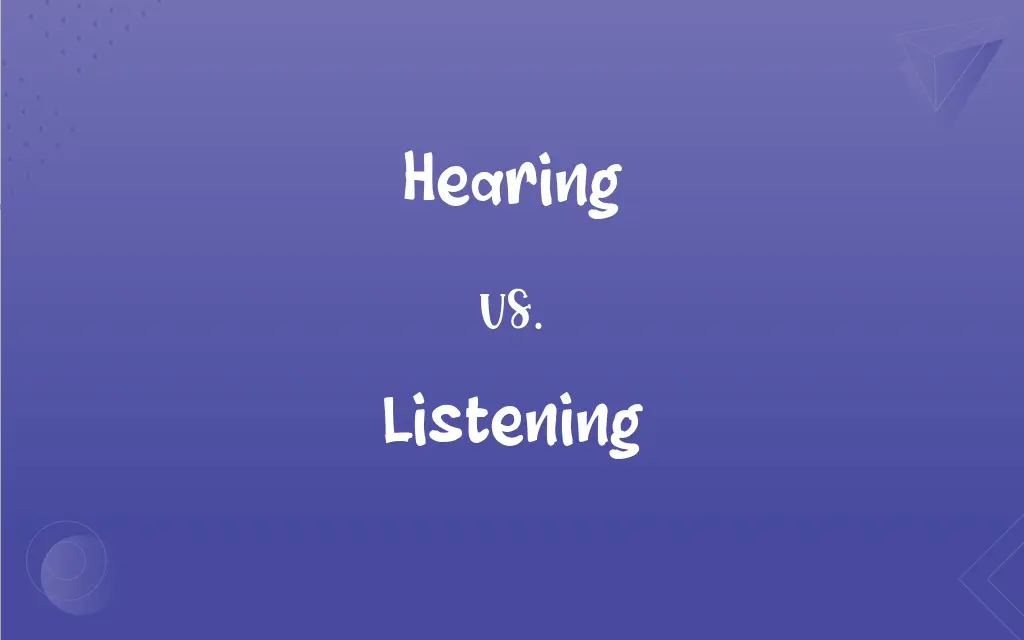Hearing vs. Listening: What's the Difference?
Edited by Janet White || By Harlon Moss || Updated on October 15, 2023
Hearing is the physical ability to perceive sounds, while listening is the intentional focus on sounds to understand and interpret them.

Key Differences
Hearing is the passive process of perceiving sounds through the ears. It is a physiological function that occurs without conscious effort. Listening, on the other hand, requires conscious attention and effort to understand the sounds or words being received.
Hearing can be considered as one of the five primary senses of the human body, where vibrations are translated into sounds by the ear. Listening is a cognitive process where the brain analyzes and interprets the sounds that are heard.
Everyone who has the physiological ability can hear, but not everyone can effectively listen. Listening requires practice, patience, and intent, while hearing simply requires functioning auditory organs.
In some situations, individuals may hear something but may not process or comprehend it. This highlights the distinction that while hearing is automatic, listening is an active process that seeks understanding.
To hear is to receive sound waves through the ears, but to listen is to pay attention, understand, and respond to those sounds, be it in conversations, music, or the environment.
ADVERTISEMENT
Comparison Chart
Nature
Passive process
Active process
Requirement
Functioning auditory organs
Attention and comprehension
Focus
Does not require focus
Requires focus and intent
Outcome
Sound perception
Sound understanding
Relation
Physiological function
Cognitive function
ADVERTISEMENT
Hearing and Listening Definitions
Hearing
The range within which sounds can be heard.
The deer was out of my hearing distance.
Listening
The skill of understanding and interpreting what is heard.
Listening is crucial in effective communication.
Hearing
The act or process of perceiving sound.
I was startled by the sudden hearing of a loud noise.
Listening
Giving ear to something with consideration.
By listening carefully, he was able to solve the mystery.
Hearing
The capacity to perceive and differentiate sounds.
Her hearing is excellent despite her age.
Listening
Actively paying attention to sounds or speech.
Listening to music is one of her favorite activities.
Hearing
An opportunity to state one's case.
They granted him a hearing before making the final decision.
Listening
The act of hearing with intent to comprehend.
She spent the evening listening to the chirping of crickets.
Hearing
A legal proceeding where evidence is taken for a decision.
The defendant will have a hearing next week.
Listening
Being alert and ready to hear something.
I am listening for any signs of distress.
Hearing
The sense by which sound is perceived; the capacity to hear.
Listening
To make an effort to hear something
Listen to the radio.
Listen for the bell that ends class.
Hearing
Range of audibility; earshot.
Listening
To pay attention; heed
“She encouraged me to listen carefully to what country people called mother wit” (Maya Angelou).
FAQs
Is hearing the same for everyone?
No, hearing abilities can vary due to age, health, or other factors.
Why is listening important?
Listening enables understanding, effective communication, and deeper connections with others.
What is hearing?
Hearing is the passive process of perceiving sounds through the ears.
Can listening to loud music damage hearing?
Yes, prolonged exposure to loud sounds can harm hearing.
Why is listening actively challenging?
It requires focus, patience, and the elimination of distractions.
What is listening?
Listening is the intentional focus on sounds to understand and interpret them.
Can animals hear the same way humans do?
Different animals have varying hearing ranges and abilities.
Is hearing loss permanent?
Not always; it can be temporary or permanent based on its cause.
Why might someone be good at hearing but bad at listening?
They might not be focusing or giving attention to the sounds they hear.
What is the anatomy behind hearing?
The ear, divided into outer, middle, and inner sections, facilitates hearing.
Can someone hear without listening?
Yes, hearing can occur without the intent to understand, which is passive.
How is listening used in therapy?
Therapists employ active listening to understand and help their clients.
What's the role of listening in education?
Listening helps students comprehend and retain information.
Is there a connection between hearing and balance?
Yes, the inner ear plays a role in both hearing and balance.
What is selective hearing?
It's when someone hears only parts of a conversation or specific sounds.
How does listening affect relationships?
Effective listening builds trust, understanding, and strengthens bonds.
How does culture impact listening?
Cultural norms and values can influence how and what we listen to.
Can hearing be restored?
Some forms of hearing loss can be treated, but not all are reversible.
How does hearing aid work?
It amplifies sounds for individuals with hearing impairment.
How can one improve listening skills?
Active listening, avoiding interruptions, and giving feedback are ways to enhance listening.
About Author
Written by
Harlon MossHarlon is a seasoned quality moderator and accomplished content writer for Difference Wiki. An alumnus of the prestigious University of California, he earned his degree in Computer Science. Leveraging his academic background, Harlon brings a meticulous and informed perspective to his work, ensuring content accuracy and excellence.
Edited by
Janet WhiteJanet White has been an esteemed writer and blogger for Difference Wiki. Holding a Master's degree in Science and Medical Journalism from the prestigious Boston University, she has consistently demonstrated her expertise and passion for her field. When she's not immersed in her work, Janet relishes her time exercising, delving into a good book, and cherishing moments with friends and family.































































